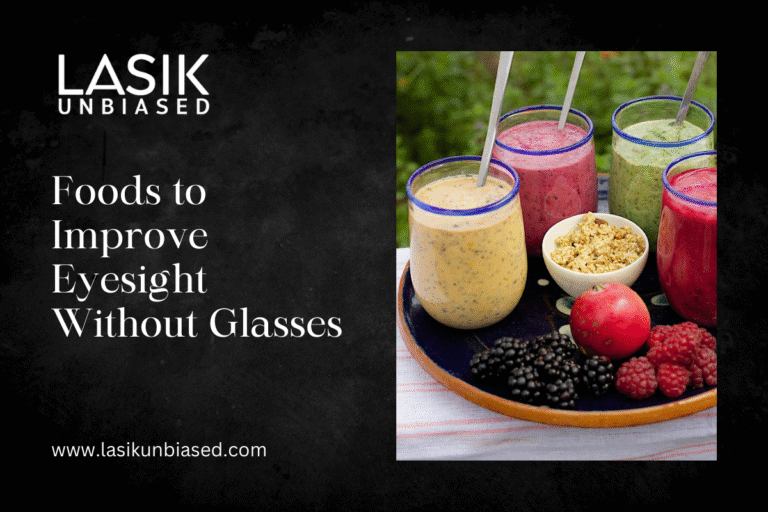Certain foods packed with essential vitamins and nutrients can support overall eye health and help prevent age-related conditions, though they do not typically reduce dependence on glasses caused by refractive errors.
By including these nutrient-dense options in your diet, you can support eye health and sharpen vision. Here’s everything you need to know.
Why Nutrition Is Key for Eye Health?
Your eyes, like any other part of your body, depend on proper nutrition to function effectively. Nutritional deficiencies can contribute to eye problems such as dry eyes, poor night vision, and may increase the risk of age-related macular degeneration. A nutrient-rich diet plays a crucial role in supporting eye health, shielding against oxidative damage, and potentially slowing the progression of age-related ocular conditions.
Key nutrients for better eyesight include:
- Vitamin A: Essential for maintaining a healthy cornea and supporting low-light (scotopic) vision.
- Omega-3 Fatty Acids: Help reduce dry eye symptoms and support retinal structure and function.
- Lutein and Zeaxanthin: These nutrients accumulate in the macula and assist in filtering harmful blue light, thereby reducing the risk of age-related macular degeneration.
- Vitamin C and E: These function as antioxidants, potentially protecting eye tissues from oxidative stress associated with cataracts and age-related macular degeneration.
- Zinc: Plays a role in transporting Vitamin A from the liver to the retina and contributes to night vision.
Top Foods to Naturally Boost Eye Health
Leafy Green Vegetables
Leafy greens such as spinach, kale, and Swiss chard are widely recognised for their substantial levels of lutein and zeaxanthin. These antioxidants play a crucial role in filtering harmful blue light and safeguarding the retina against oxidative stress. Additionally, leafy greens provide Vitamin C, which strengthens blood vessels in the eyes and reduces the risk of cataracts.
- Try adding a handful of raw spinach to your morning smoothie or include kale chips as a healthy snack.
Citrus Fruits
Citrus fruits, including oranges, grapefruits, and lemons, serve as abundant sources of Vitamin C. This essential nutrient helps combat oxidative stress within the eyes and reduces the risk of age-related macular degeneration.
- Start your day with a glass of freshly squeezed orange juice or enjoy a grapefruit as a mid-morning snack.
Carrots and Sweet Potatoes
Beta-carotene, which converts to Vitamin A in the body, is abundant in orange and yellow-coloured vegetables like carrots and sweet potatoes. Vitamin A is essential for maintaining a healthy cornea and supporting low-light (scotopic) vision.
- Snack on some raw baby carrots with hummus or bake sweet potato wedges for a nutrient-dense side dish.
Fatty Fish
Salmon, mackerel, tuna, and sardines are rich in omega-3 fatty acids, which are essential for preventing dry eyes and maintaining retinal health. Omega-3s may help reduce the risk of age-related macular degeneration (AMD) and alleviate dry eye symptoms.
- Incorporate grilled salmon into your dinner menu or enjoy tuna sandwiches for lunch to get your dose of omega-3s.
Eggs
Egg yolks are packed with lutein, zeaxanthin, zinc, and Vitamin A, making them a powerhouse food for improving eyesight. These nutrients promote macular health and may help diminish the risk of age-related vision impairments.
- Start your morning with a scrambled egg breakfast or add a boiled egg as part of your meal prep salad.
Nuts and Seeds
Almonds, walnuts, chia seeds, flaxseeds, and sunflower seeds are loaded with Vitamin E and omega-3 fatty acids. Vitamin E functions as an antioxidant, providing protection to eye cells against oxidative damage linked to age-related conditions such as cataracts and age-related macular degeneration (AMD).
- Grab a handful of raw nuts as a snack, sprinkle seeds on your oatmeal, or add walnuts to your smoothie.
Bell Peppers
Brightly coloured bell peppers, particularly red and yellow varieties, are great for eye health due to their high Vitamin C content and abundance of beta-carotene. They are a rich source of vitamin C, which supports the maintenance of healthy blood vessels in the eyes and may contribute to reducing the risk of cataract development.
- Slice bell peppers into strips for a crunchy snack or toss them into salads and stir-fries for added flavour.
Whole Grains
Replacing refined carbohydrates with whole grains can enhance eye health by controlling blood sugar levels and reducing the risk of age-related macular degeneration. Whole grains provide zinc and vitamin E, nutrients that support overall eye health and may help prevent age-related vision problems.
- Swap white rice for brown rice or make overnight oats with your favourite toppings for breakfast.
Berries
Berries such as blueberries, strawberries, and blackberries contain antioxidants like anthocyanins that improve blood flow to the retina, reduce inflammation, and strengthen vision. They are abundant in vitamin C and other antioxidants, which contribute to eye health and may lower the risk of cataracts and age-related macular degeneration (AMD).
- Mix a handful of berries into your yoghurt or smoothie for a tasty, eye-friendly treat.
Legumes
Chickpeas, black beans, lentils, and kidney beans are rich in zinc, which is crucial for maintaining night vision and overall eye health. Zinc is essential for the transportation of vitamin A from the liver to the retina, where it contributes to the production of melanin, a pigment that protects the eyes.
- Include lentil soup in your meals or toss chickpeas into salads for a nutrient-packed addition to your diet.
Broccoli and Brussels Sprouts
These cruciferous vegetables provide a combination of lutein, zeaxanthin, and Vitamin C, making them excellent for preventing oxidative damage to eye cells. Their combination of antioxidants may contribute to reducing the risk of cataracts and age-related macular degeneration.
- Roast Brussels sprouts with olive oil and sea salt or steam some broccoli as a side dish alongside your main meal.
Dark Chocolate
Dark chocolate contains flavonoids that may support retinal health, but more research is needed to confirm its direct benefits for vision. Just be sure to choose chocolate with a high cocoa content (70% or more) for maximum benefits.
- Savour a few squares of dark chocolate as a guilt-free indulgence.
Habits to Maximise the Power of Foods for Eye Health
While diet is pivotal in enhancing eyesight naturally, adopting a few habits can help maximise the benefits:
- Stay Hydrated: Proper hydration prevents dry eyes and promotes general well-being.
- Practice the 20-20-20 Rule: For every 20 minutes of screen time, look at an object 20 feet away for 20 seconds.
- Wear Sunglasses: Protect your eyes from UV damage when outdoors.
- Regular Check-ups: Routine visits to an eye doctor can help identify underlying issues early on.
Foods Play a Pivotal Role in Vision Health
Supporting long-term eye health isn’t just about what you eat, but how you make these foods an integral part of your lifestyle. With a diet rich in nutrients like lutein, zeaxanthin, Vitamin A, C, E, and omega-3s, you can protect your eyes, enhance vision, and say goodbye to preventable eye concerns.


